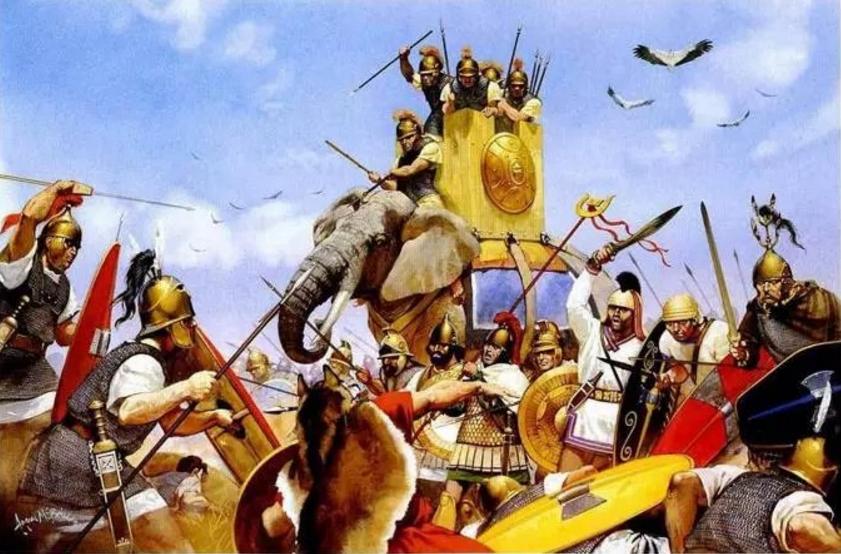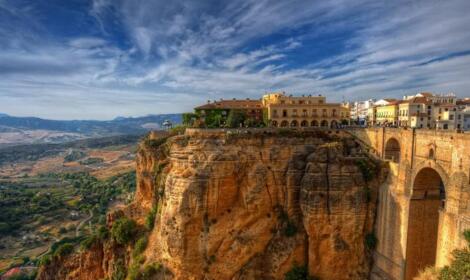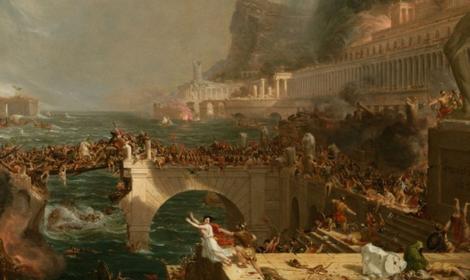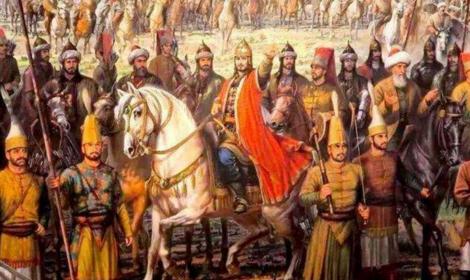罗马为什么不入侵非洲内陆?(一)
正文翻译

Why didn''t Rome invade the African interior?
罗马为什么不入侵非洲内陆?(一)

Why didn''t Rome invade the African interior?
罗马为什么不入侵非洲内陆?(一)
评论翻译
Brian Bollig
I will mainly answer by discrediting many answers here—the Romans did attempt to conquer certain parts of the African interior. We know they tried to conquer as far south down the Nile as Meroe. The Tomb of Cestius in Rome serves as a possible lix to Cestius serving on campaign in Nubia.
We also know that, while mainly commercial, expeditions were sent through the Sahara to establish trade routes, there were exceptions such as the city of Garamantia, which was conquered in southern Libya. Augustus sent legions to support expeditions through the interior of the Sahara, as well as down the western coast, probably at least as far south as the Ivory Coast and as far west as the Canary Islands.
我主要通过质疑这里的许多答案来回答——罗马人确实试图征服非洲内陆的某些地区。我们知道他们试图征服尼罗河以南的梅洛。罗马的切斯提乌斯墓可能与切斯提乌斯在努比亚的战役有关。
我们还知道,虽然主要是商业性质的,但也曾派遣探险队穿越撒哈拉沙漠建立贸易路线,其中有个例外是南利比亚的加拉曼提亚城被征服。奥古斯都派遣军团支援穿越撒哈拉沙漠内陆和西海岸的探险队,很可能南至象牙海岸,西至加那利群岛。
Expeditions down the Nile are also mentioned. Its speculated that Nero planned an invasion of southern Nubia and possibly Ethiopia due to his sending reinforcements to Meroe, but the campaign was never carried out. It is also speculated that the Romans had sent expeditions as far south as Uganda, the real enemy, as it was for the Greeks who had attempted to pentetrate the deep interior of Africa, was malaria.
The Romans did conquer the interior of Africa in many ways, but as it is today, places with little population base hardly serve as a place to be conquered. Another good example of this is the interior of the Arabian Peninsula—hardly out of reach for the Romans, yet little to be had as a result. Even so, the Romans were very much involved through trade, and even conquest when possible in Africa. These areas, more practically, served as backwaters of the Empire who benefitted from trade on the fringes of Rome’s borders.
还提到了沿尼罗河的探险。据推测,尼禄计划入侵南努比亚,可能还包括埃塞俄比亚,因为他向梅洛派遣了增援部队,但这次战役从未实施。还有推测称,罗马人甚至派遣探险队到达乌干达,但像希腊人曾试图进入非洲深处一样,真正的敌人是疟疾。
罗马人确实以多种方式征服了非洲内陆,但正如今天一样,人口稀少的地方很难成为被征服的地方。另一个很好的例子是阿拉伯半岛内陆,对罗马人来说几乎不可触及,但几乎没有什么可获得的结果。即便如此,罗马人在非洲的贸易中仍然非常活跃,有机会时甚至进行征服。这些地区从实际上来说,是帝国的边缘地区,从与罗马边界贸易中受益。
Matt Riggsby
Perhaps you’re unfamiliar with the Sahara. It looks a bit like this.
There’s a lot of sand. And then some rocks. And then more sand. And then more rocks…well, you get the idea. It’s also very, very hot. It’s invadeable, in the sense that you can certainly send troops there, but it’s not inhabitable. There’s no water aside from a few oases here and there, there’s essentially no cultivable land, and there are no people aside from a handful of folks who are largely on their way somewhere else. In short, there’s no reason to go there, and nothing to be gained by sending limited and expensive armies to take charge of miles and miles of barren, hot, dry sand. Indeed, the southern Roman border was pretty much their safest because nobody was going to come in their direction. It was an excellent natural border. The places to send troops are the ones where it’ll do you some good.
也许您对撒哈拉不熟悉。它看起来有点像这样。
那里有很多沙子。然后一些岩石。然后更多的沙子。然后更多的岩石……好吧,你明白了。而且非常非常热。从侵略的角度来说,你肯定可以派遣部队到那里,但那里是无法居住的。除了零星的几个绿洲外,没有水源,基本上没有可耕种的土地,也没有人们居住,大部分人只是在路过。简而言之,那里没有去的理由,派遣军队限制在数英里的贫瘠、炎热、干燥的沙漠里得不偿失。实际上,罗马南部边境是相当安全的,因为没有人会向其方向进攻。那是一个优秀的天然边界。应该派遣军队的地方是有用的地方。
Now, perhaps the Romans could have made it farther around the African coasts, but even those were pretty grim across that band. There are Roman ports at places like Berenike in southern Egypt which were reasonably lucrative in the India trade, but still in desert. Pushing south towards possibly more desirable lands farther south which the Romans may or may not have known about didn’t make a lot of sense. By the time they got even close, they had bigger problems to deal with, like defending themselves from Germans and Persians. Invading places was largely off the menu by then.
现在,也许罗马人可以走得更远,沿着非洲海岸线前进,但即使在那些地方,情况也非常不好。在埃及南部的Bereneike等地有着罗马港口,是印度贸易中相对有利可图的地方,但仍然在沙漠中。向南推进,可能前往罗马人可能已知或未知的更多渴望之地,在那里没有太多意义。当他们甚至还没有接近时,他们就有更大的问题要处理,比如保护自己免受日耳曼人和波斯人攻击。那时,入侵其他地方基本上不是优先考虑的事项。
Carla Berlusconi
This is just a quick answer for now.
Africa is not a country it is a continent and it is vast. As you no doubt know the Africa we normally see on maps is distorted to fit in with a Western Centric view, that’s not a criticism as such just a statement.
To get an idea of the scale take a look at the graphic below from the website Scientific American;
Big isn’t it? It can encompass all of Europe (including the Scandinavian countries not shown), the USA, China, India and Japan. That would be a significant percentage of the human race. So conquering a large part of North Africa as they did would have been a similar area as the furthest reaches they conquered in Europe.
这只是一个简短的回答。
非洲不是一个国家,而是一个大陆,它非常广阔。正如您无疑所知,我们通常在地图上看到的非洲是为了适应西方中心主义观点而扭曲的,这不是一种批评,只是一种陈述。
为了对其规模有所了解,请看下面从Scientific American网站引用的图片:
很大吧?它可以覆盖整个欧洲(包括未显示的斯堪的纳维亚国家),美国,中国,印度和日本。那将会涵盖人类种族的相当比例。因此,征服他们在北非征服的大片区域与他们在欧洲征服的最远处差不多。
So the challenges for the Roman Empire were not only in subduing the many different nations in Africa, but also contending with different language families, hostile terrain (including the Sahara Desert), intense heat (all the time), wild animals the like of which did not exist in Europe plus deadly diseases, the like of which also didn’t exist in Europe and to a lesser extent North Africa.
The Romans were pragmatists too, although they would have been aware of the gold and other riches available they would have made an assessment whether or not to travel further south based on the cost, risk and possible gain. Why make yourself bankrupt/dead when there were easy rich pickings nearby, along established trade routes, amongst people already subjugated.
Asking why they didn’t go any further into Africa is almost the same as asking why they didn’t go and conquer the Americas, the challenge would have been of a similar magnitude…….big.
因此,罗马帝国面临的挑战不仅是征服非洲众多不同的民族,还要处理不同的语言家族、敌视的地形(包括撒哈拉沙漠)、强烈的炎热(一年四季都有)、欧洲不存在的野生动物以及致命疾病(欧洲和北非也没有)。罗马人也是实用主义者,虽然他们可能意识到存在黄金和其他财富,但他们会根据成本、风险和可能的利润来评估是否继续南下。如果已经在经过开拓的贸易路线上,在已经受制于罗马的人群中有容易获取的财富,为什么要让自己破产/死亡呢?
问为什么他们没有走得更远进入非洲几乎就像问为什么他们没有去征服美洲,挑战的规模将会相似...... 非常大。
Jose Geraldo Gouvea
Has a degree in History and worked for some years as a high school teacher.6y
Because they didn’t find there anything they wanted. Rome did need some sand for construction projects, but they could pick all that they needed quite close to the coast, so there was no need to penetrate the Sahara.
Remember that no Empire in history has wilfully sent soldiers across a huge desert just to see what’s beyond. The exploration of the African lands south of the Sahara was undertaken by sea first. Long before Timbuktu was found the European powers were already colonising the southern half of Africa. Most of the Saharan exploration was conducted long after, and there’s a reason why international borders in the desert are so square: they were drawn before the desert was explored and mapped.
If the European powers of the XVI — XIX centuries sailed around Africa instead of marching through the desert, it is quite natural that the Romans, 1500 years before, would not be able to accomplish that feat with their technology.
因为他们在那里没有找到任何他们想要的东西。罗马确实需要一些沙子用于建筑项目,但他们可以从靠近海岸的地方获取所需要的沙子,所以没有必要穿越撒哈拉沙漠。
请记住,历史上没有一个帝国愿意派遣士兵穿过巨大的沙漠只是为了看看那里是什么。探索萨赫勒以南的非洲土地首先是通过海上进行的。远在蒂姆布图被发现之前,欧洲大国已经开始殖民非洲的南半部了。大多数萨哈拉沙漠的探险是在很久以后才进行的,而国际边界在沙漠中非常方正的原因是:它们是在沙漠被探索和绘制地图之前划定的。
如果十六至十九世纪的欧洲大国选择环绕非洲而不是穿越沙漠,那么罗马人使用的技术距今已有1500年,显然无法完成这项壮举。
James Gunn
Ancient Rome had at most one million people. But the Roman Empire had somewhere between 80 and 90 million people. It was by far one of the largest empires of the ancient world. Look up a map of it to see its remarkable extension. It is almost unbelievable that this huge empire could be conquered and ruled for such a long time by such a small number of people. I think the answer to your question is that Rome did not have the human resources to extend any further than it did.
古罗马最多只有一百万人。但罗马帝国拥有大约八千至九千万人口,是古代世界中最大的帝国之一。查看地图可以看到它惊人的扩展范围,这个巨大的帝国由如此少量的人统治了如此长时间,几乎不可思议。我认为你的问题的答案是罗马没有足够的人力资源来进一步扩张。
Ron Hollis
Few people realise the scales involved. As others have pointed out, the geography was a fearsome barrier, however, at it pinnacle, the Roman Empire covered 1.6 million sq miles, whilst Africa covers 11.7 million sq miles, approximately 10 times the size. Noting that Rome was struggling to administer and control its empire anyway, the idea that they could also take on Africa is not tenable.
很少有人意识到这些规模的差距。正如其他人指出的那样,地理条件是一个可怕的障碍。然而,在巅峰时期,罗马帝国覆盖了160万平方英里(约合414.4万平方千米),而非洲面积为1170万平方英里(约合3037万平方千米),大约是其10倍。鉴于罗马已经在艰难地管理和控制其帝国,他们还能够承担挑战非洲的想法是不可行的。
Abdul Hayeshi
All previous answers such as “there was nothing that they wanted”, or there were harsh conditions like the sahara” are typical examples of denying “African Agency”. It was not ignorance of valuable resources or harsh clmates that kept Romans away. It was human endeavour.
That is, the Romans were deafeated by the Kushites militarily under Queen Amanishekhato in 24BC. The Romans were not ignorant of the gold available south of Egypt. They were just human beings who also lose wars like everybody else.
之前的回答,比如“他们没有想要的东西”或者“撒哈拉沙漠等条件非常恶劣”,都是典型的否认“非洲机构”的例子。不是对有价值的资源或恶劣气候的无知使罗马人远离了非洲。而是人类的努力。
也就是说,罗马人在公元前24年被库施王国在女王阿曼尼谢卡托的领导下军事上击败了。罗马人并不是对南边的埃及以外的黄金一无所知,他们只是像其他人一样会输掉战争的普通人。
Roderick White
Carla Berlusconi’s answer is pretty good!
In fact the Romans did advance south through Egypt as far as Meroe, but failed to defeat that state, and went no further. A marble head of Augustus was found buried in a doorway in Meroe, which appears to have been a deliberate insult. There were, too Roman bases down the Red Sea coast, as far as one of the islands in the Bab Al Mandab strait between Aden and Africa.
Roman expansion beyond the Mediterranean was largely a matter of trade, after the end of the republic. The Romans were not particularly adventurous explorers, and were happy to let trade come to them in many cases - they had more sense than to try to cross the Sahara, and their far eastern trade was actually conducted mainly by Greeks from Alexandria. An offshoot of this trade took ‘Romans’ down the coast of east Africa as far as roughly modern Mombasa, trading with Axum (roughly modern Ethiopia) and other kingdoms further south.
Carla Berlusconi的答案相当不错!
事实上,罗马人确实向南通过埃及一直前进到墨洛,但未能打败该国,并没有进一步前进。在墨洛发现了奥古斯都的大理石头像被埋在一个门口里,这似乎是一种蓄意的侮辱。此外,在红海沿岸还有罗马的基地,一直延伸到亚丁和非洲之间的巴布尔曼德卜海峡中的一个岛屿。
罗马人在地中海以外的扩张主要是关于贸易的,这是在共和国终结后进行的。罗马人并不是特别冒险的探险家,在许多情况下,他们很乐意让贸易来到他们身边——他们足够明智而不尝试穿越撒哈拉沙漠,他们的远东贸易实际上主要由亚历山大的希腊人来进行。这个贸易的一个分支将“罗马人”带到了东非海岸,以及现代肯尼亚城市蒙巴萨附近,与阿克苏姆(大致位于现代埃塞俄比亚)以及更南部的其他王国进行贸易。
Richard Sternberg
Take a look at a geological map. You will see that there is a huge desert called the Sahara just below Northern Africa. There were tribesmen who could traverse that desert during Roman times, but the Romans could not. Much later, advances in sailing allowed Europeans to go around the Sahara Desert via the Atlantic and the Indian Oceans, but that didn't happen until the end of the Middle Ages. It was possible to circumvent the Sahara through Egypt and the Nile, but the cataracts made journey by waterway impassible. That left travel by foot through Ethiopia and Kenya, which leads to a fascinating theory of Ethiopian Jewry and the history of the Ark of the Covenant, but the Romans did not pursue that route. Basically, in the geography of the world with the technology of the Roman Era, sub-Saharan Africa was a different continent than Carthage.
看一下地质地图吧,你会发现北非下面有一个巨大的叫做撒哈拉的沙漠。在罗马时期,有些部族可以穿过沙漠,但罗马人做不到。后来,航海技术的进步让欧洲人通过大西洋和印度洋绕过了撒哈拉沙漠,但那是直到中世纪结束之后才发生的事情。通过埃及和尼罗河绕过撒哈拉是可能的,但是因为急流的存在,水路旅行是不可行的。这留给人们通过埃塞俄比亚和肯尼亚徒步旅行,这也导致了关于埃塞俄比亚犹太人和约柜历史的迷人理论,但罗马人没有走这条路。简而言之,在罗马时代的技术条件下,撒哈拉以南的非洲与迦太基是不同的大陆。
P N
Well the Romans and the Greeks tried to invade the kingdom of Kush, the Romans failed miserably many times as the legendary Kushites prevented them from conquering their empire and peoples. Eventually the Romans were forced to sign a treaty with the Kushites that they will not try to conquer their lands again and from that day on the Romans never came back LOL.
Alexander the Great went with his army to enter into the Kush kingdom and the queen of Kush sent a messenger with an arrow as a symbol of peace or war if the Greeks wanted to fight. Alexander the great backed off and decided not to dare it. Both Romans and Greeks were long familiar with the Kushites and their conquests in Africa and the middle east, and their presence in some parts of Asia and the Mediterranean. They were some of the most fiercest and mightiest warriors of the ancient world and gained the fear and respect of the ancient world. They also knew of King Cambyses of Persia who attempted to conquer Kush and was utterly destroyed, the Kushites also colonized Egypt for a while to get the foreign invaders out of Egypt and restore the culture of Egypt as Kush is the bigger brother to Egypt and needed to sort out the little brother who got too big for his boots and suffered foreign invasions as a result. The Romans knew they could not match with them and probably assumed that all other lands in Africa was controlled by Kushites. The intense heat of Africa interior combined with malaria and other diseases they would have gotten because they did not live in that habitat made it a suicide mission for the Romans and Greeks.
罗马人和希腊人曾经试图入侵库施王国,然而多次惨败,传说中的库施人阻止了他们征服他们的帝国和人民。最终,罗马人被迫与库施人签订了一项协议,承诺不再试图征服他们的土地,从那以后罗马人就再也没有回来过,哈哈。
亚历山大大帝曾带领他的军队进入了库施王国,库施女王派遣使者送来一只箭头,作为和平或战争的象征。亚历山大大帝退缩了,决定不冒险。罗马人和希腊人长时间对库施人及其在非洲、中东和亚洲地区的征服有所了解,并在地中海部分地区存在。他们是古代世界最凶悍和最强大的战士之一,赢得了古代世界的恐惧和尊重。他们还知道波斯国王康比西斯曾试图征服库施并被彻底摧毁,库施人还殖民埃及一段时间,以将外来入侵者赶出埃及,恢复埃及文化,因为库施是埃及的老大哥,需要整顿自己的弟弟,以防止他骄傲自大而遭受外来入侵的打击。罗马人知道他们无法与库施人相媲美,可能认为非洲其他地区也被库施人所掌控。非洲内陆的酷热加上疟疾等其他疾病,他们因不生活在那种环境中而很可能患上,这对罗马人和希腊人来说是自杀式的任务。
Miguel Evaristo
Obviously, because of the Sahara desert. No legions and, basically, no colonial empire would venture to make large cities in the interior of this large desert.
However, Romans could round the Sahara desert by conquering the African coast and, when they find the rainforests and savannahs, they would venture to the interior. But why they didn’t do it? Because it had no interest by them. Of course, there was ivory, gold, slaves and a lots of more resources, but there were no civilizations around to make trading. That’s why Romans conquered only the land around the Mediterranean Sea, because it was a circle of sea where every land touching it was Roman territory, where commerce could be practiced.
Romans were no Britons. They were not destined to conquer every shitting land that there is in the world. Romans were just there to stay.
显然,是因为撒哈拉沙漠的存在。没有军队和基本上没有殖民帝国会冒险在这个大沙漠内部建造大城市。
然而,罗马人可以通过征服非洲海岸来绕过撒哈拉沙漠,当他们发现热带雨林和草原时,他们会冒险进入内陆。但为什么他们没有这样做呢?因为那对他们来说没有利益。当然,有象牙、黄金、奴隶和更多资源,但周围没有文明可以进行贸易。这就是为什么罗马人只征服了地中海周围的土地,因为它是一片连通这些土地的海洋环,每个与之接触的土地都是罗马领土,可以进行贸易。
罗马人不是英国人,他们并不注定要征服世界上每个地方。罗马人只是待在那里。
Allan Lanktree
For the same reason European powers didn’t colonize Africa until after 1820.
Quinine.
Ironically the problems the Europeans were having in Africa were the same problems the Native Amerindians were having with the Europeans. DISEASE.
When the Europeans left Africa they left behind their immunity to African diseases and picked up immunity to the diseases the would later annihilate the Amerindians.
Then, in 1820, in South America another irony, the plant that produces Quinine was found and gave the Europeans the tool they needed to conquer Africa. However this was almost 400 years after the fall of the Eastern Roman Empire and 1400 years after the fall of the Western Roman Empire.
由于奎宁药的原因,欧洲列强直到1820年后才殖民非洲。
具有讽刺意义的是,欧洲人在非洲遇到的问题与美洲土著人面对欧洲人的问题相同,即疾病。
当欧洲人离开非洲时,他们留下了对非洲疾病的免疫力,并获得了针对后来将灭绝美洲土著人的疾病的免疫力。
然后,在1820年,在南美洲又出现了讽刺的事情:发现了生产奎宁药的植物,给了欧洲人征服非洲所需的工具。但这是在东罗马帝国倒塌近400年,西罗马帝国倒塌近1400年之后。
William Moran
The coast and the Nile Valley was where it was happening. South of the coast and west of the Nile was impenetrable desert. Rome could take Egypt by taking its northerly cities.
There was no need to capture the Sahara desert. Rome had no need for sand.
最有活力的地方是沿海和尼罗河谷。在沿海以南和尼罗河以西,是难以穿越的沙漠。罗马可以通过攻占尼罗河谷北部的城市来占领埃及。
没有必要控制撒哈拉沙漠。罗马不需要沙子。
Daniel DeFoe
When one studies History, it is imperative that you also study geology lite, or Geography. To look at the structure of the Roman Empire and how far they could go, you should look at a map of Africa, the Mediterranean coastal area is just to the north of a very large mostly impassible with out modern transportation due to the desert known as the Sahara. While there are paths through, for the most part for what geologists believe for the last 10,000 years the desert has been there stopping most from venturing in and crossing it, and coming out on the other side alive. There is also the consideration of economic power, and logistics of supporting the troops. Remember a rule about invasion, it requires an army, and an army marches forward based on how well the stomach is filled. No water to drink, no food to sustain it, no army marches very far.
当一个人研究历史时,有必要也学习一些地质学或地理学基础。要查看罗马帝国的结构以及他们能够到达的范围,您应该查看非洲地图,地中海沿岸区域位于一个巨大而大多无法通过的沙漠——撒哈拉以北。虽然有道路可以通行,但自10000年以来,地质学家相信这个沙漠让大多数人无法冒险穿越并在另一侧安全出来。还要考虑经济实力和支持部队的后勤学问题。记住入侵的一条规则,它需要一支军队,并且仅当士兵的胃口得到满足时才会前进。没有水喝,没有食物维持,没有一支军队能够走得很远。
Matthew Kleid
Septimius Severus did invade the interior of Africa to deal with the Garamantes and occupied their capital Garama in southern Libya.
While rich natural resources lay beyond the Sahara, only the Tuareg peoples could cross the Sahara desert, and certainly no army could survive through it at this time.
塞普蒂米乌斯·塞维鲁斯确实入侵非洲内部以对付加拉曼特人,并占领了他们在利比亚南部的首都加拉马。
虽然撒哈拉沙漠以外富有自然资源,但只有图阿雷格人能够穿越撒哈拉沙漠,当时肯定没有军队能够在其中存活。
Geoffrey Richard Driscoll-Tobin
Rome reached Yemen and Ethiopia by sea (the latter also perhaps by following the Nile upstream).
Logistically, sustaining a widely dispersed subsaharan and european empire was probably infeasible until the modern era.
罗马通过海路到达了也门和埃塞俄比亚(后者可能也是通过追随尼罗河而上实现的)。从后勤角度来看,在现代之前,维系一个广泛分散的撒哈拉以南和欧洲帝国可能是不可行的。
Noah Tackett
Because crossing the Sahara is difficult enough by yourself. Imagine sending Roman Legions having to carry tons of gear, weapons, and wearing armor across the Sahara desert to try to conquer the interior of Africa. It would be one thing if the Sahara were a lush fertile land, but it’s hasn’t been for all of human history. It would’ve been a waste of a very expensive asset, and if Rome had lost multiple legions trying to get to the interior of Africa, they would’ve had so many problems at the end of the day. It would be a death sentence for them.
Egypt was all they really needed out of Africa, though the African Mediterranean coast was a nice bonus for them.
Now, had Rome realized the potential of the steam engine(it was developed as far back as Ancient Greece), and developed railroads and industrialized, that would be a different story. Yes it would be lethal to the Romans to try to build railroads in the Sahara, but once they mastered the art of doing it quickly, they’d have fewer problems and may well have been an eternal empire.
But that’s alternate history, and actual history is far more mundane a lot of times.
因为单独穿越撒哈拉沙漠就已经非常困难了。想象一下,罗马军团要携带大量装备、武器和战甲穿过撒哈拉沙漠去征服非洲内陆,这将是多么可怕的浪费资源。如果罗马在试图进入非洲内陆时失去了多个军团,那最终会给他们造成很多问题,这实际上是在宣判死刑。
埃及是他们在非洲真正需要的地方,虽然非洲地中海沿岸对他们来说也是一个好处。
现在,如果罗马能够意识到蒸汽机的潜力(它早在古希腊时期就被发明了),并且发展铁路和工业化,那将是一个不同的故事。是的,如果罗马人试图在撒哈拉沙漠中修建铁路,那么对他们来说会非常危险。但一旦他们掌握了快速修建铁路的技术,就会少遇到很多问题,或许会成为一个永恒的帝国。
但这只是人们构想出来的虚构历史,实际的历史更多时候是平淡无奇的。
I will mainly answer by discrediting many answers here—the Romans did attempt to conquer certain parts of the African interior. We know they tried to conquer as far south down the Nile as Meroe. The Tomb of Cestius in Rome serves as a possible lix to Cestius serving on campaign in Nubia.
We also know that, while mainly commercial, expeditions were sent through the Sahara to establish trade routes, there were exceptions such as the city of Garamantia, which was conquered in southern Libya. Augustus sent legions to support expeditions through the interior of the Sahara, as well as down the western coast, probably at least as far south as the Ivory Coast and as far west as the Canary Islands.
我主要通过质疑这里的许多答案来回答——罗马人确实试图征服非洲内陆的某些地区。我们知道他们试图征服尼罗河以南的梅洛。罗马的切斯提乌斯墓可能与切斯提乌斯在努比亚的战役有关。
我们还知道,虽然主要是商业性质的,但也曾派遣探险队穿越撒哈拉沙漠建立贸易路线,其中有个例外是南利比亚的加拉曼提亚城被征服。奥古斯都派遣军团支援穿越撒哈拉沙漠内陆和西海岸的探险队,很可能南至象牙海岸,西至加那利群岛。
Expeditions down the Nile are also mentioned. Its speculated that Nero planned an invasion of southern Nubia and possibly Ethiopia due to his sending reinforcements to Meroe, but the campaign was never carried out. It is also speculated that the Romans had sent expeditions as far south as Uganda, the real enemy, as it was for the Greeks who had attempted to pentetrate the deep interior of Africa, was malaria.
The Romans did conquer the interior of Africa in many ways, but as it is today, places with little population base hardly serve as a place to be conquered. Another good example of this is the interior of the Arabian Peninsula—hardly out of reach for the Romans, yet little to be had as a result. Even so, the Romans were very much involved through trade, and even conquest when possible in Africa. These areas, more practically, served as backwaters of the Empire who benefitted from trade on the fringes of Rome’s borders.
还提到了沿尼罗河的探险。据推测,尼禄计划入侵南努比亚,可能还包括埃塞俄比亚,因为他向梅洛派遣了增援部队,但这次战役从未实施。还有推测称,罗马人甚至派遣探险队到达乌干达,但像希腊人曾试图进入非洲深处一样,真正的敌人是疟疾。
罗马人确实以多种方式征服了非洲内陆,但正如今天一样,人口稀少的地方很难成为被征服的地方。另一个很好的例子是阿拉伯半岛内陆,对罗马人来说几乎不可触及,但几乎没有什么可获得的结果。即便如此,罗马人在非洲的贸易中仍然非常活跃,有机会时甚至进行征服。这些地区从实际上来说,是帝国的边缘地区,从与罗马边界贸易中受益。
Matt Riggsby
Perhaps you’re unfamiliar with the Sahara. It looks a bit like this.
There’s a lot of sand. And then some rocks. And then more sand. And then more rocks…well, you get the idea. It’s also very, very hot. It’s invadeable, in the sense that you can certainly send troops there, but it’s not inhabitable. There’s no water aside from a few oases here and there, there’s essentially no cultivable land, and there are no people aside from a handful of folks who are largely on their way somewhere else. In short, there’s no reason to go there, and nothing to be gained by sending limited and expensive armies to take charge of miles and miles of barren, hot, dry sand. Indeed, the southern Roman border was pretty much their safest because nobody was going to come in their direction. It was an excellent natural border. The places to send troops are the ones where it’ll do you some good.
也许您对撒哈拉不熟悉。它看起来有点像这样。
那里有很多沙子。然后一些岩石。然后更多的沙子。然后更多的岩石……好吧,你明白了。而且非常非常热。从侵略的角度来说,你肯定可以派遣部队到那里,但那里是无法居住的。除了零星的几个绿洲外,没有水源,基本上没有可耕种的土地,也没有人们居住,大部分人只是在路过。简而言之,那里没有去的理由,派遣军队限制在数英里的贫瘠、炎热、干燥的沙漠里得不偿失。实际上,罗马南部边境是相当安全的,因为没有人会向其方向进攻。那是一个优秀的天然边界。应该派遣军队的地方是有用的地方。
Now, perhaps the Romans could have made it farther around the African coasts, but even those were pretty grim across that band. There are Roman ports at places like Berenike in southern Egypt which were reasonably lucrative in the India trade, but still in desert. Pushing south towards possibly more desirable lands farther south which the Romans may or may not have known about didn’t make a lot of sense. By the time they got even close, they had bigger problems to deal with, like defending themselves from Germans and Persians. Invading places was largely off the menu by then.
现在,也许罗马人可以走得更远,沿着非洲海岸线前进,但即使在那些地方,情况也非常不好。在埃及南部的Bereneike等地有着罗马港口,是印度贸易中相对有利可图的地方,但仍然在沙漠中。向南推进,可能前往罗马人可能已知或未知的更多渴望之地,在那里没有太多意义。当他们甚至还没有接近时,他们就有更大的问题要处理,比如保护自己免受日耳曼人和波斯人攻击。那时,入侵其他地方基本上不是优先考虑的事项。
Carla Berlusconi
This is just a quick answer for now.
Africa is not a country it is a continent and it is vast. As you no doubt know the Africa we normally see on maps is distorted to fit in with a Western Centric view, that’s not a criticism as such just a statement.
To get an idea of the scale take a look at the graphic below from the website Scientific American;
Big isn’t it? It can encompass all of Europe (including the Scandinavian countries not shown), the USA, China, India and Japan. That would be a significant percentage of the human race. So conquering a large part of North Africa as they did would have been a similar area as the furthest reaches they conquered in Europe.
这只是一个简短的回答。
非洲不是一个国家,而是一个大陆,它非常广阔。正如您无疑所知,我们通常在地图上看到的非洲是为了适应西方中心主义观点而扭曲的,这不是一种批评,只是一种陈述。
为了对其规模有所了解,请看下面从Scientific American网站引用的图片:
很大吧?它可以覆盖整个欧洲(包括未显示的斯堪的纳维亚国家),美国,中国,印度和日本。那将会涵盖人类种族的相当比例。因此,征服他们在北非征服的大片区域与他们在欧洲征服的最远处差不多。
So the challenges for the Roman Empire were not only in subduing the many different nations in Africa, but also contending with different language families, hostile terrain (including the Sahara Desert), intense heat (all the time), wild animals the like of which did not exist in Europe plus deadly diseases, the like of which also didn’t exist in Europe and to a lesser extent North Africa.
The Romans were pragmatists too, although they would have been aware of the gold and other riches available they would have made an assessment whether or not to travel further south based on the cost, risk and possible gain. Why make yourself bankrupt/dead when there were easy rich pickings nearby, along established trade routes, amongst people already subjugated.
Asking why they didn’t go any further into Africa is almost the same as asking why they didn’t go and conquer the Americas, the challenge would have been of a similar magnitude…….big.
因此,罗马帝国面临的挑战不仅是征服非洲众多不同的民族,还要处理不同的语言家族、敌视的地形(包括撒哈拉沙漠)、强烈的炎热(一年四季都有)、欧洲不存在的野生动物以及致命疾病(欧洲和北非也没有)。罗马人也是实用主义者,虽然他们可能意识到存在黄金和其他财富,但他们会根据成本、风险和可能的利润来评估是否继续南下。如果已经在经过开拓的贸易路线上,在已经受制于罗马的人群中有容易获取的财富,为什么要让自己破产/死亡呢?
问为什么他们没有走得更远进入非洲几乎就像问为什么他们没有去征服美洲,挑战的规模将会相似...... 非常大。
Jose Geraldo Gouvea
Has a degree in History and worked for some years as a high school teacher.6y
Because they didn’t find there anything they wanted. Rome did need some sand for construction projects, but they could pick all that they needed quite close to the coast, so there was no need to penetrate the Sahara.
Remember that no Empire in history has wilfully sent soldiers across a huge desert just to see what’s beyond. The exploration of the African lands south of the Sahara was undertaken by sea first. Long before Timbuktu was found the European powers were already colonising the southern half of Africa. Most of the Saharan exploration was conducted long after, and there’s a reason why international borders in the desert are so square: they were drawn before the desert was explored and mapped.
If the European powers of the XVI — XIX centuries sailed around Africa instead of marching through the desert, it is quite natural that the Romans, 1500 years before, would not be able to accomplish that feat with their technology.
因为他们在那里没有找到任何他们想要的东西。罗马确实需要一些沙子用于建筑项目,但他们可以从靠近海岸的地方获取所需要的沙子,所以没有必要穿越撒哈拉沙漠。
请记住,历史上没有一个帝国愿意派遣士兵穿过巨大的沙漠只是为了看看那里是什么。探索萨赫勒以南的非洲土地首先是通过海上进行的。远在蒂姆布图被发现之前,欧洲大国已经开始殖民非洲的南半部了。大多数萨哈拉沙漠的探险是在很久以后才进行的,而国际边界在沙漠中非常方正的原因是:它们是在沙漠被探索和绘制地图之前划定的。
如果十六至十九世纪的欧洲大国选择环绕非洲而不是穿越沙漠,那么罗马人使用的技术距今已有1500年,显然无法完成这项壮举。
James Gunn
Ancient Rome had at most one million people. But the Roman Empire had somewhere between 80 and 90 million people. It was by far one of the largest empires of the ancient world. Look up a map of it to see its remarkable extension. It is almost unbelievable that this huge empire could be conquered and ruled for such a long time by such a small number of people. I think the answer to your question is that Rome did not have the human resources to extend any further than it did.
古罗马最多只有一百万人。但罗马帝国拥有大约八千至九千万人口,是古代世界中最大的帝国之一。查看地图可以看到它惊人的扩展范围,这个巨大的帝国由如此少量的人统治了如此长时间,几乎不可思议。我认为你的问题的答案是罗马没有足够的人力资源来进一步扩张。
Ron Hollis
Few people realise the scales involved. As others have pointed out, the geography was a fearsome barrier, however, at it pinnacle, the Roman Empire covered 1.6 million sq miles, whilst Africa covers 11.7 million sq miles, approximately 10 times the size. Noting that Rome was struggling to administer and control its empire anyway, the idea that they could also take on Africa is not tenable.
很少有人意识到这些规模的差距。正如其他人指出的那样,地理条件是一个可怕的障碍。然而,在巅峰时期,罗马帝国覆盖了160万平方英里(约合414.4万平方千米),而非洲面积为1170万平方英里(约合3037万平方千米),大约是其10倍。鉴于罗马已经在艰难地管理和控制其帝国,他们还能够承担挑战非洲的想法是不可行的。
Abdul Hayeshi
All previous answers such as “there was nothing that they wanted”, or there were harsh conditions like the sahara” are typical examples of denying “African Agency”. It was not ignorance of valuable resources or harsh clmates that kept Romans away. It was human endeavour.
That is, the Romans were deafeated by the Kushites militarily under Queen Amanishekhato in 24BC. The Romans were not ignorant of the gold available south of Egypt. They were just human beings who also lose wars like everybody else.
之前的回答,比如“他们没有想要的东西”或者“撒哈拉沙漠等条件非常恶劣”,都是典型的否认“非洲机构”的例子。不是对有价值的资源或恶劣气候的无知使罗马人远离了非洲。而是人类的努力。
也就是说,罗马人在公元前24年被库施王国在女王阿曼尼谢卡托的领导下军事上击败了。罗马人并不是对南边的埃及以外的黄金一无所知,他们只是像其他人一样会输掉战争的普通人。
Roderick White
Carla Berlusconi’s answer is pretty good!
In fact the Romans did advance south through Egypt as far as Meroe, but failed to defeat that state, and went no further. A marble head of Augustus was found buried in a doorway in Meroe, which appears to have been a deliberate insult. There were, too Roman bases down the Red Sea coast, as far as one of the islands in the Bab Al Mandab strait between Aden and Africa.
Roman expansion beyond the Mediterranean was largely a matter of trade, after the end of the republic. The Romans were not particularly adventurous explorers, and were happy to let trade come to them in many cases - they had more sense than to try to cross the Sahara, and their far eastern trade was actually conducted mainly by Greeks from Alexandria. An offshoot of this trade took ‘Romans’ down the coast of east Africa as far as roughly modern Mombasa, trading with Axum (roughly modern Ethiopia) and other kingdoms further south.
Carla Berlusconi的答案相当不错!
事实上,罗马人确实向南通过埃及一直前进到墨洛,但未能打败该国,并没有进一步前进。在墨洛发现了奥古斯都的大理石头像被埋在一个门口里,这似乎是一种蓄意的侮辱。此外,在红海沿岸还有罗马的基地,一直延伸到亚丁和非洲之间的巴布尔曼德卜海峡中的一个岛屿。
罗马人在地中海以外的扩张主要是关于贸易的,这是在共和国终结后进行的。罗马人并不是特别冒险的探险家,在许多情况下,他们很乐意让贸易来到他们身边——他们足够明智而不尝试穿越撒哈拉沙漠,他们的远东贸易实际上主要由亚历山大的希腊人来进行。这个贸易的一个分支将“罗马人”带到了东非海岸,以及现代肯尼亚城市蒙巴萨附近,与阿克苏姆(大致位于现代埃塞俄比亚)以及更南部的其他王国进行贸易。
Richard Sternberg
Take a look at a geological map. You will see that there is a huge desert called the Sahara just below Northern Africa. There were tribesmen who could traverse that desert during Roman times, but the Romans could not. Much later, advances in sailing allowed Europeans to go around the Sahara Desert via the Atlantic and the Indian Oceans, but that didn't happen until the end of the Middle Ages. It was possible to circumvent the Sahara through Egypt and the Nile, but the cataracts made journey by waterway impassible. That left travel by foot through Ethiopia and Kenya, which leads to a fascinating theory of Ethiopian Jewry and the history of the Ark of the Covenant, but the Romans did not pursue that route. Basically, in the geography of the world with the technology of the Roman Era, sub-Saharan Africa was a different continent than Carthage.
看一下地质地图吧,你会发现北非下面有一个巨大的叫做撒哈拉的沙漠。在罗马时期,有些部族可以穿过沙漠,但罗马人做不到。后来,航海技术的进步让欧洲人通过大西洋和印度洋绕过了撒哈拉沙漠,但那是直到中世纪结束之后才发生的事情。通过埃及和尼罗河绕过撒哈拉是可能的,但是因为急流的存在,水路旅行是不可行的。这留给人们通过埃塞俄比亚和肯尼亚徒步旅行,这也导致了关于埃塞俄比亚犹太人和约柜历史的迷人理论,但罗马人没有走这条路。简而言之,在罗马时代的技术条件下,撒哈拉以南的非洲与迦太基是不同的大陆。
P N
Well the Romans and the Greeks tried to invade the kingdom of Kush, the Romans failed miserably many times as the legendary Kushites prevented them from conquering their empire and peoples. Eventually the Romans were forced to sign a treaty with the Kushites that they will not try to conquer their lands again and from that day on the Romans never came back LOL.
Alexander the Great went with his army to enter into the Kush kingdom and the queen of Kush sent a messenger with an arrow as a symbol of peace or war if the Greeks wanted to fight. Alexander the great backed off and decided not to dare it. Both Romans and Greeks were long familiar with the Kushites and their conquests in Africa and the middle east, and their presence in some parts of Asia and the Mediterranean. They were some of the most fiercest and mightiest warriors of the ancient world and gained the fear and respect of the ancient world. They also knew of King Cambyses of Persia who attempted to conquer Kush and was utterly destroyed, the Kushites also colonized Egypt for a while to get the foreign invaders out of Egypt and restore the culture of Egypt as Kush is the bigger brother to Egypt and needed to sort out the little brother who got too big for his boots and suffered foreign invasions as a result. The Romans knew they could not match with them and probably assumed that all other lands in Africa was controlled by Kushites. The intense heat of Africa interior combined with malaria and other diseases they would have gotten because they did not live in that habitat made it a suicide mission for the Romans and Greeks.
罗马人和希腊人曾经试图入侵库施王国,然而多次惨败,传说中的库施人阻止了他们征服他们的帝国和人民。最终,罗马人被迫与库施人签订了一项协议,承诺不再试图征服他们的土地,从那以后罗马人就再也没有回来过,哈哈。
亚历山大大帝曾带领他的军队进入了库施王国,库施女王派遣使者送来一只箭头,作为和平或战争的象征。亚历山大大帝退缩了,决定不冒险。罗马人和希腊人长时间对库施人及其在非洲、中东和亚洲地区的征服有所了解,并在地中海部分地区存在。他们是古代世界最凶悍和最强大的战士之一,赢得了古代世界的恐惧和尊重。他们还知道波斯国王康比西斯曾试图征服库施并被彻底摧毁,库施人还殖民埃及一段时间,以将外来入侵者赶出埃及,恢复埃及文化,因为库施是埃及的老大哥,需要整顿自己的弟弟,以防止他骄傲自大而遭受外来入侵的打击。罗马人知道他们无法与库施人相媲美,可能认为非洲其他地区也被库施人所掌控。非洲内陆的酷热加上疟疾等其他疾病,他们因不生活在那种环境中而很可能患上,这对罗马人和希腊人来说是自杀式的任务。
Miguel Evaristo
Obviously, because of the Sahara desert. No legions and, basically, no colonial empire would venture to make large cities in the interior of this large desert.
However, Romans could round the Sahara desert by conquering the African coast and, when they find the rainforests and savannahs, they would venture to the interior. But why they didn’t do it? Because it had no interest by them. Of course, there was ivory, gold, slaves and a lots of more resources, but there were no civilizations around to make trading. That’s why Romans conquered only the land around the Mediterranean Sea, because it was a circle of sea where every land touching it was Roman territory, where commerce could be practiced.
Romans were no Britons. They were not destined to conquer every shitting land that there is in the world. Romans were just there to stay.
显然,是因为撒哈拉沙漠的存在。没有军队和基本上没有殖民帝国会冒险在这个大沙漠内部建造大城市。
然而,罗马人可以通过征服非洲海岸来绕过撒哈拉沙漠,当他们发现热带雨林和草原时,他们会冒险进入内陆。但为什么他们没有这样做呢?因为那对他们来说没有利益。当然,有象牙、黄金、奴隶和更多资源,但周围没有文明可以进行贸易。这就是为什么罗马人只征服了地中海周围的土地,因为它是一片连通这些土地的海洋环,每个与之接触的土地都是罗马领土,可以进行贸易。
罗马人不是英国人,他们并不注定要征服世界上每个地方。罗马人只是待在那里。
Allan Lanktree
For the same reason European powers didn’t colonize Africa until after 1820.
Quinine.
Ironically the problems the Europeans were having in Africa were the same problems the Native Amerindians were having with the Europeans. DISEASE.
When the Europeans left Africa they left behind their immunity to African diseases and picked up immunity to the diseases the would later annihilate the Amerindians.
Then, in 1820, in South America another irony, the plant that produces Quinine was found and gave the Europeans the tool they needed to conquer Africa. However this was almost 400 years after the fall of the Eastern Roman Empire and 1400 years after the fall of the Western Roman Empire.
由于奎宁药的原因,欧洲列强直到1820年后才殖民非洲。
具有讽刺意义的是,欧洲人在非洲遇到的问题与美洲土著人面对欧洲人的问题相同,即疾病。
当欧洲人离开非洲时,他们留下了对非洲疾病的免疫力,并获得了针对后来将灭绝美洲土著人的疾病的免疫力。
然后,在1820年,在南美洲又出现了讽刺的事情:发现了生产奎宁药的植物,给了欧洲人征服非洲所需的工具。但这是在东罗马帝国倒塌近400年,西罗马帝国倒塌近1400年之后。
William Moran
The coast and the Nile Valley was where it was happening. South of the coast and west of the Nile was impenetrable desert. Rome could take Egypt by taking its northerly cities.
There was no need to capture the Sahara desert. Rome had no need for sand.
最有活力的地方是沿海和尼罗河谷。在沿海以南和尼罗河以西,是难以穿越的沙漠。罗马可以通过攻占尼罗河谷北部的城市来占领埃及。
没有必要控制撒哈拉沙漠。罗马不需要沙子。
Daniel DeFoe
When one studies History, it is imperative that you also study geology lite, or Geography. To look at the structure of the Roman Empire and how far they could go, you should look at a map of Africa, the Mediterranean coastal area is just to the north of a very large mostly impassible with out modern transportation due to the desert known as the Sahara. While there are paths through, for the most part for what geologists believe for the last 10,000 years the desert has been there stopping most from venturing in and crossing it, and coming out on the other side alive. There is also the consideration of economic power, and logistics of supporting the troops. Remember a rule about invasion, it requires an army, and an army marches forward based on how well the stomach is filled. No water to drink, no food to sustain it, no army marches very far.
当一个人研究历史时,有必要也学习一些地质学或地理学基础。要查看罗马帝国的结构以及他们能够到达的范围,您应该查看非洲地图,地中海沿岸区域位于一个巨大而大多无法通过的沙漠——撒哈拉以北。虽然有道路可以通行,但自10000年以来,地质学家相信这个沙漠让大多数人无法冒险穿越并在另一侧安全出来。还要考虑经济实力和支持部队的后勤学问题。记住入侵的一条规则,它需要一支军队,并且仅当士兵的胃口得到满足时才会前进。没有水喝,没有食物维持,没有一支军队能够走得很远。
Matthew Kleid
Septimius Severus did invade the interior of Africa to deal with the Garamantes and occupied their capital Garama in southern Libya.
While rich natural resources lay beyond the Sahara, only the Tuareg peoples could cross the Sahara desert, and certainly no army could survive through it at this time.
塞普蒂米乌斯·塞维鲁斯确实入侵非洲内部以对付加拉曼特人,并占领了他们在利比亚南部的首都加拉马。
虽然撒哈拉沙漠以外富有自然资源,但只有图阿雷格人能够穿越撒哈拉沙漠,当时肯定没有军队能够在其中存活。
Geoffrey Richard Driscoll-Tobin
Rome reached Yemen and Ethiopia by sea (the latter also perhaps by following the Nile upstream).
Logistically, sustaining a widely dispersed subsaharan and european empire was probably infeasible until the modern era.
罗马通过海路到达了也门和埃塞俄比亚(后者可能也是通过追随尼罗河而上实现的)。从后勤角度来看,在现代之前,维系一个广泛分散的撒哈拉以南和欧洲帝国可能是不可行的。
Noah Tackett
Because crossing the Sahara is difficult enough by yourself. Imagine sending Roman Legions having to carry tons of gear, weapons, and wearing armor across the Sahara desert to try to conquer the interior of Africa. It would be one thing if the Sahara were a lush fertile land, but it’s hasn’t been for all of human history. It would’ve been a waste of a very expensive asset, and if Rome had lost multiple legions trying to get to the interior of Africa, they would’ve had so many problems at the end of the day. It would be a death sentence for them.
Egypt was all they really needed out of Africa, though the African Mediterranean coast was a nice bonus for them.
Now, had Rome realized the potential of the steam engine(it was developed as far back as Ancient Greece), and developed railroads and industrialized, that would be a different story. Yes it would be lethal to the Romans to try to build railroads in the Sahara, but once they mastered the art of doing it quickly, they’d have fewer problems and may well have been an eternal empire.
But that’s alternate history, and actual history is far more mundane a lot of times.
因为单独穿越撒哈拉沙漠就已经非常困难了。想象一下,罗马军团要携带大量装备、武器和战甲穿过撒哈拉沙漠去征服非洲内陆,这将是多么可怕的浪费资源。如果罗马在试图进入非洲内陆时失去了多个军团,那最终会给他们造成很多问题,这实际上是在宣判死刑。
埃及是他们在非洲真正需要的地方,虽然非洲地中海沿岸对他们来说也是一个好处。
现在,如果罗马能够意识到蒸汽机的潜力(它早在古希腊时期就被发明了),并且发展铁路和工业化,那将是一个不同的故事。是的,如果罗马人试图在撒哈拉沙漠中修建铁路,那么对他们来说会非常危险。但一旦他们掌握了快速修建铁路的技术,就会少遇到很多问题,或许会成为一个永恒的帝国。
但这只是人们构想出来的虚构历史,实际的历史更多时候是平淡无奇的。









